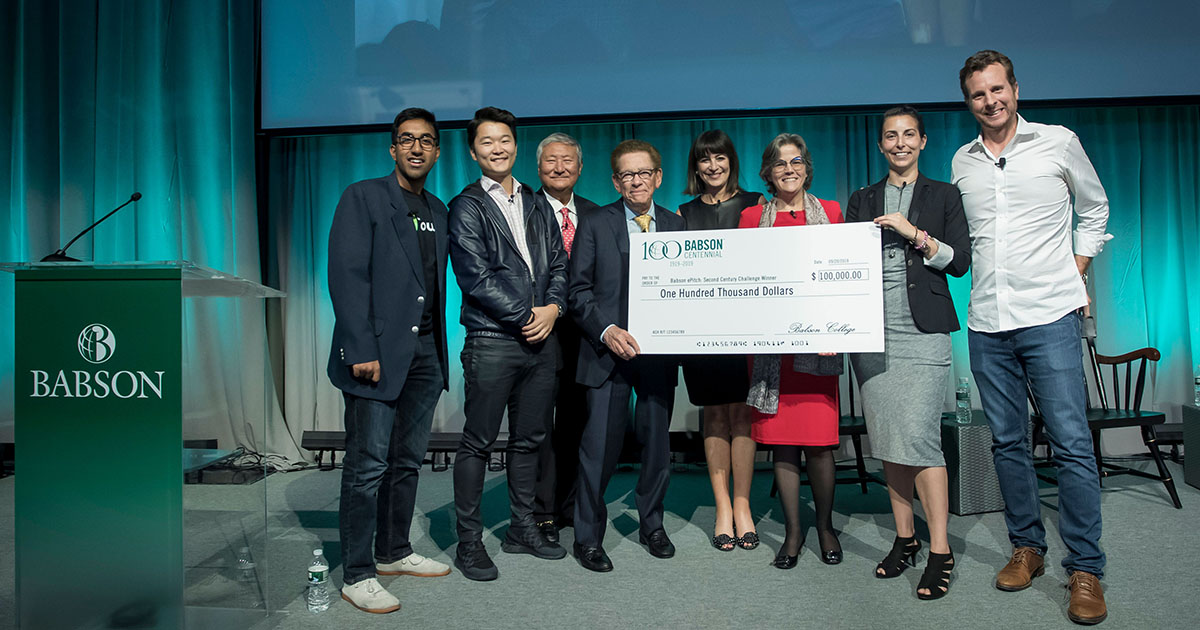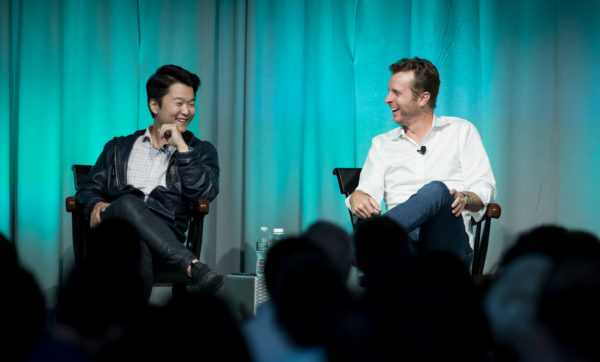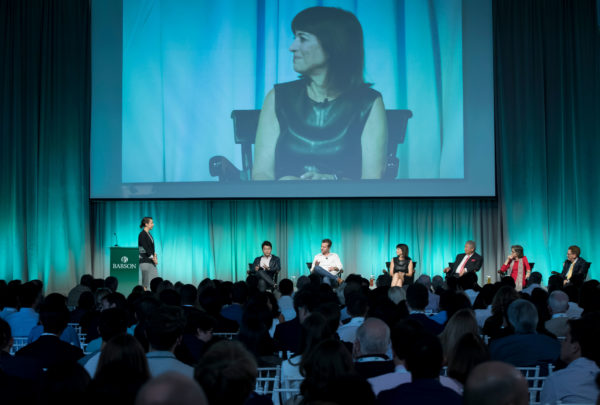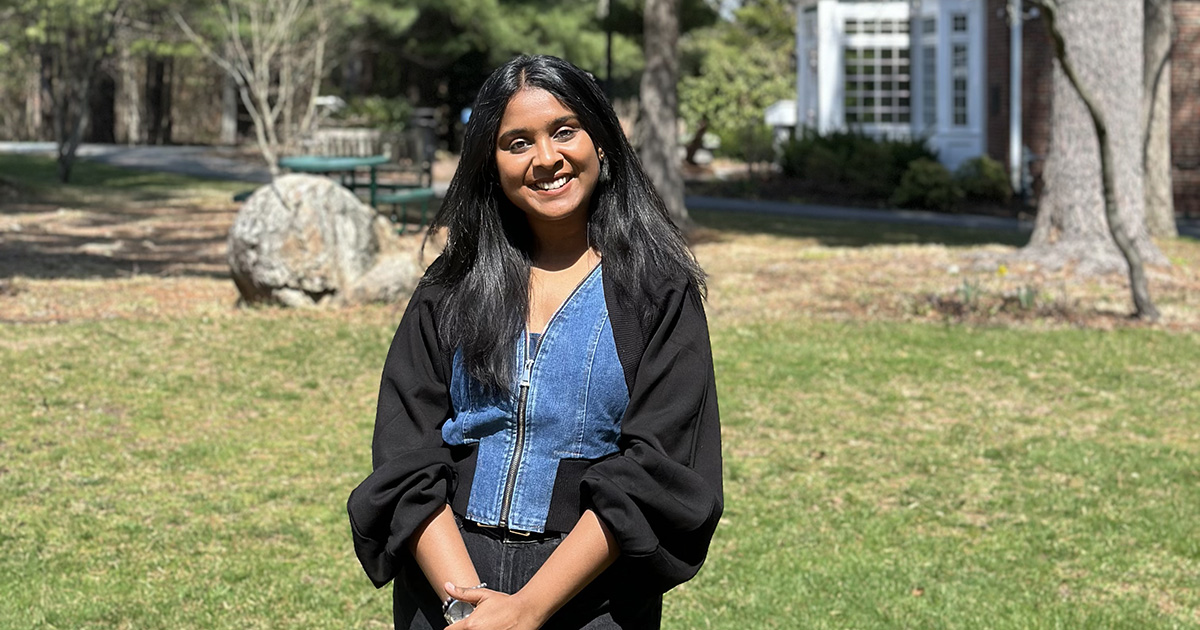TORq Interface Wins Big

“And the winner is, TORq Interface!”
After three impressive pitches at Babson’s biggest business competition yet, Joanna Geisinger MBA’17 and her team at TORq Interface went home with $100,000 and the winning title.
Babson ePitch: Second Century Challenge
The room was stacked.
In the judges’ corner sat Jamie Siminoff ’99, founder and chief inventor of Ring; Diane Hessan, founder and chairman of C Space; Tim Chae ’13, general partner of 500 Startups; Fred Kiang ’70, MBA’75, H’19, Babson trustee, and founder and chairman of Sunrise Duty Free; Alicia Castillo Holley MBA’96, CEO of Wealthing Institute; and Babson entrepreneur and senior lecturer Edward Marram.
Preparing for the chance to win an incredible investment, and the opportunity to pitch these well-known judges, were three entrepreneurs: Renee Fry, founder of Gentreo and an alumna of Babson’s Women Innovating Now (WIN) Lab®; and two Summer Venture Program alumni, Ryan Laverty ’20, co-founder of Arist, and Joanna Geisinger MBA’17, founder of TORq Interface.
Hosted in coordination with eTower, Babson’s student-led entrepreneurial living-learning organization, Babson ePitch: Second Century Challenge was the culmination of a year’s worth of planning and community-wide engagement at the College’s Centennial Celebration.
“We were super interested in this idea from the start,” said Sumukh Setty ’21, eTower president and CEO of TILE, who was contacted one year ago to help plan the event. “To be involved in something of this caliber, during Babson’s biggest and most exciting year yet . . . this was an unmatched opportunity in terms of visibility, access, and experience.”

The Theme? Businesses Built to Make a Difference
Fry opened with a pitch for Gentreo, a software service for easy and accessible estate planning. To get the judges to understand the magnitude of the problem she’s trying to solve, she shared a true story from the company’s CTO—whose family had to pay $10,000 to close a $5,000 estate.
“We’re on a mission to get 10 million people to protect their families,” said Fry.
Fry took every chance she could to thank Babson’s WIN Lab®, advising other women entrepreneurs to join this community and noting that it has already given her and the company more opportunity and support than she could have imagined.
Next was current student-led business Arist—the first text message learning platform.
Why text message courses? It all started with a simple realization—that while only 20 percent of the world has video internet access for digital learning, 67 percent has a cellphone, and there are now many delivery options, including SMS, WhatsApp, Facebook Messenger, WeChat, and more.
Laverty, a current senior at Babson College, outlined the perfect pitch on behalf of his all-student team, including Michael Ioffe ’21, Maxine Anderson ’22, and Joe Passanante from Quinnipiac University.
When asked by Judge Chae if they would drop out and pursue the business full time with a $100,000 investment, Laverty got sentimental.
“The reality is that we’ve built this while being college students,” he said. “I don’t doubt that for the average college student, staying would be an inhibitor, but Babson has and will be more of a catalyst for our business than anything.”
The reality is that we’ve built this while being college students. I don’t doubt that for the average college student, staying would be an inhibitor, but Babson has and will be more of a catalyst for our business than anything.
Ryan Laverty '20, co-founder of Arist
An extended cheer and applause rang across the audience, filled with alumni, faculty, administration, family, and friends.
The Winning Pitch
Geisinger, on behalf of TORq Interface, concluded the pitch competition with a clear passion and expertise for modernizing surgical planning. The platform, which is already used in 17 renowned U.S. hospitals, allows for secure, real-time, and efficient communication between hospitals and their medical device vendors—an obvious win-win for both.
“Device vendors are in 38 percent of all U.S. procedures, so if a device representative doesn’t know about a procedure [or a change in schedule], the procedure will be canceled or delayed,” Geisinger explained.
Why doesn’t a solution for this yet exist? “Because it wasn’t technologically feasible until today,” she said. Former President Obama passed an act to make electronic records mandatory for all hospitals by 2019. “That’s what makes being a part of TORq [right now] so fun,” said Geisinger.
 Judge Chae jumped on the opportunity for Q&A, not to ask a question about the business, but to make an offer. “Are you willing to come out to San Francisco to work with my team for four months?” he asked.
Judge Chae jumped on the opportunity for Q&A, not to ask a question about the business, but to make an offer. “Are you willing to come out to San Francisco to work with my team for four months?” he asked.
Judges Hessan and Castillo Holley followed with back-to-back questions about price structure, operations, and partners. Geisinger didn’t miss a beat.
“I’ll give you $20,000 for 1 percent of the company, on the condition that you stay in Boston,” added Hessan, garnering a loud and excited response from the crowd. “You’re right here in Massachusetts, a place trying to be the center of digital health, with a whole bunch of people rooting for you.”
After 15 minutes, Geisinger had received upward of $170,000 in investment offers, including $25,000 from Judge Siminoff who was persuaded by Chae to get involved with her company because he was that confident in what she’s doing.
 Being able to announce the winner is a “great honor,” closed Judge Marram. “Making this decision was so difficult. I like them all but we had to vote, and the winner is TORq Interface!”
Being able to announce the winner is a “great honor,” closed Judge Marram. “Making this decision was so difficult. I like them all but we had to vote, and the winner is TORq Interface!”
Geisinger left with the $100,000 prize, and some big decisions to make on whether she would take the judges’ deals, or not.



